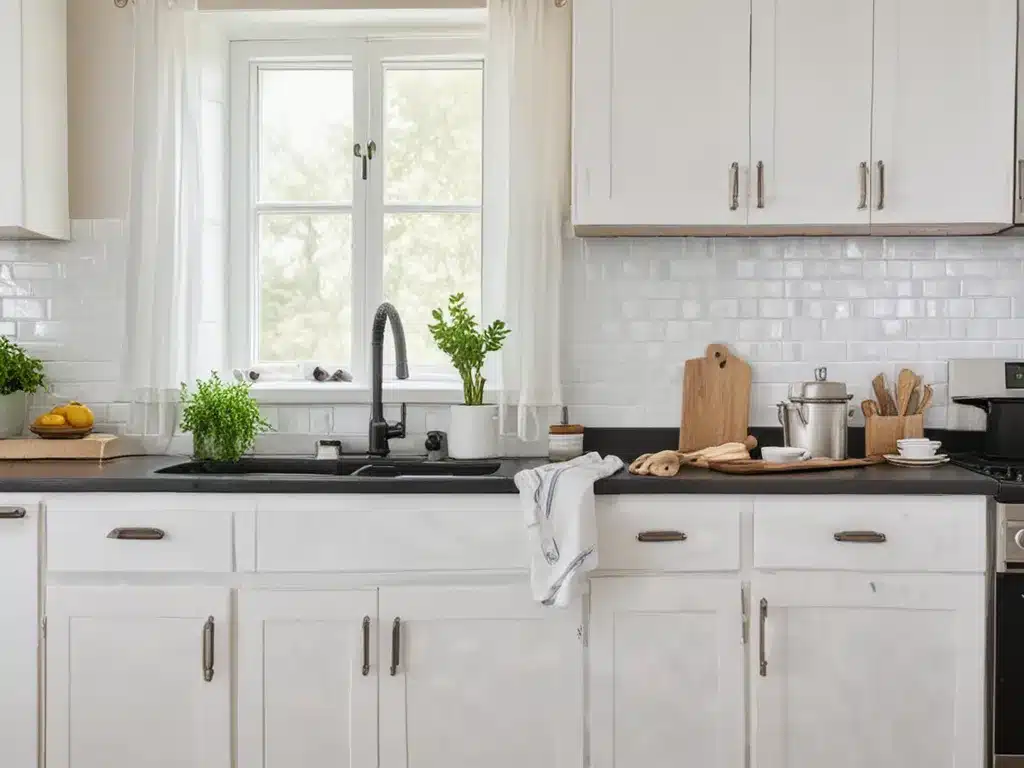Introduction
Maintaining a sanitary kitchen is crucial for preventing foodborne illnesses. Kitchens are hotspots for harmful bacteria like Salmonella, E. coli, and Listeria that can contaminate foods and cause serious illnesses if ingested. Thankfully, there are many effective ways to kill germs and sanitize kitchen surfaces. In this article, I will discuss various methods, products, and best practices for deep cleaning and sanitizing your kitchen of germs and bacteria.
Clean and Disinfect Kitchen Surfaces
Regular cleaning and disinfecting of kitchen surfaces is key to reducing levels of bacteria. Here are some best practices:
-
Clean kitchen surfaces with hot, soapy water first to remove grease and debris. Rinse and let air dry.
-
Disinfect surfaces by spraying or wiping with an EPA-registered disinfectant. Look for disinfectants that specifically kill bacteria and viruses.
-
Allow the disinfectant to sit for the product’s recommended contact time to fully sanitize the surface.
-
Focus on disinfecting frequently touched sites like countertops, sinks, fridge handles, and kitchen cabinet handles.
-
Clean up spills right away, especially spills of raw meat juices which can spread bacteria.
-
Sanitize cutting boards between each use, especially after cutting raw meats which can harbor bacteria.
-
Replace kitchen sponges often as they are prone to bacterial growth when wet. Disinfect sponges daily.
Regular disinfecting of surfaces helps lower the overall bacterial load in the kitchen.
Cleaning Products that Kill Germs
Using the right cleaning products is important for combatting germs. Here are effective options:
-
Bleach solutions are very effective at killing bacteria, viruses and other pathogens. Mix 1 tbsp bleach per 1 gallon of water.
-
Quaternary ammonium (QUATs) detergents have anti-microbial properties. Lysol and Clorox wipes contain QUATs.
-
Hydrogen peroxide based cleaners break down cell walls of bacteria. OxiClean is an example.
-
Vinegar has antibacterial properties. Distilled white vinegar can be used to clean many kitchen surfaces.
-
Tea tree oil has natural disinfecting abilities. Add a few drops to your cleaner or scrub.
-
Steam cleaners use very hot steam to sanitize and are chemical-free. Great for countertops and appliances.
Using disinfectants correctly is key – follow instructions for concentration, contact time and proper ventilation.
Sanitize Appliances and Kitchenware
It’s important to regularly disinfect kitchen appliances and kitchenware that encounter food. Here are some tips:
-
Clean inside appliances like microwaves and refrigerators with a disinfectant cleaner or bleach solution.
-
Sanitize food storage containers by handwashing in hot soapy water or running through the dishwasher.
-
Use the sanitize setting on your dishwasher which heats water to 160°F to kill germs.
-
Sanitize cutting boards by washing thoroughly with soap and hot water. Also periodically sanitize in the dishwasher or soak in a dilute bleach solution.
-
Clean can openers and bottle openers with soap and hot water after each use.
-
Replace kitchen sponges frequently as bacteria tend to collect in the moisture.
Taking these extra steps keeps appliances and kitchenware free of harmful bacteria.
Prevent Cross-Contamination
Cross-contamination is one of the main ways kitchen germs spread. Here are tips to avoid it:
-
Separate raw meats, poultry and seafood from other foods in your grocery bags, refrigerator and during food prep.
-
Use separate cutting boards and utensils for produce and ready-to-eat foods versus raw meat and poultry.
-
Never place cooked foods back on the same plate or cutting board that previously held raw food without washing first.
-
Wash hands thoroughly with soap and warm water after handling raw meats and before prepping other foods.
-
Clean sink and surrounding area thoroughly after washing meats/poultry to avoid spreading bacteria.
-
Wash reusable grocery bags frequently since raw meat juices may spill into them.
Being mindful of cross-contamination and consciously separating foods during storage and prep reduces bacterial transfer.
Handling Food Safely
Safe food handling habits limit foodborne illnesses. Follow these guidelines when handling food:
-
Wash hands for 20 seconds with soap before and after handling food.
-
Rinse fruits and vegetables thoroughly under running water even if peeling them.
-
Do not thaw foods at room temperature – thaw in the refrigerator instead.
-
Marinate foods in the refrigerator. Bacteria multiply rapidly in marinades at room temperature.
-
Cook meats thoroughly to the proper internal temperature to kill bacteria. Use a food thermometer to verify.
-
Store leftovers within 2 hours and eat within 3-4 days. Discard old leftovers as bacteria multiply over time.
-
Avoid the “danger zone” of 40° to 140°F where bacteria thrive. Keep cold foods cold and hot foods hot.
Following safe food handling procedures reduces the likelihood of foodborne illnesses.
Conclusion
Regular deep cleaning, disinfecting and food safety practices are necessary to keep a kitchen free of harmful germs and bacteria. Focus on hot spots like countertops and sinks, utilize antimicrobial cleaners, sanitize appliances and kitchenware, avoid cross-contamination, and handle food properly. With diligent sanitizing habits, you can feel confident in the cleanliness and safety of your kitchen.







